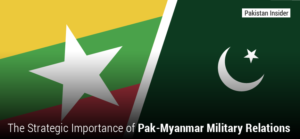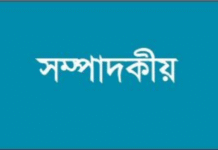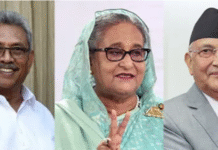Myanmar, the then Burma, was not friendly to Bangladesh during 1971 war.
Burma became the route of supply for the Pakistan forces as India restricted use of its airspace by the Pakistanis. Personnel, arms and ammunition reached the Pakistanis though Burma. Air sorties refueled and rested in Burma. Towards the end of the war, Pakistani soldiers and officers escaped to Burma. One of those officers was Major General Rahim, who ransacked my hometown Chandpur.
The Indian Parliament proceedings of 2nd July 1971 mentioned that Burma was not ally of India and Bangladesh in this struggle. The West Bengal (India) Assembly Proceedings on July 31, 1971 discussed that Burma had not recognized the fleeing population as refugee which only India did. The Burmese forces did some skirmishes during December 1971 in the Burma-India-Bangladesh border region to divert world’s attention.
The Bangladesh Government-in-Exile in June 1971 declared that about 50,000 Bangladeshi fled to Burma of which 20,000 were indigenous people. On 20th April, some of the elected Bangalee representatives had met with the Burmese officials at Balibazar of Rakhine. The officials told them that fleeing East Pakistanis can live only in the camps however their Govt would not provide food, medicine and security; and they must not do anything against Pakistan. Burma was not kind to them; the refugees were put in ghettoes and many of them were handed over to the occupying force for conspiring against Pakistan.
Pakistan and Myanmar established formal military relations in 1952. During the Indo-Pakistani War of 1971 which saw India-backed Mukti Bahini break off East Pakistan, a large number of Pakistani soldiers were being taken as Prisoners Of War (POWs). Fortunately, several army and mostly Pakistan Air Force (PAF) personnel were given safe passage by the state of Burma. In his monumental memoir ‘Witness To Surrender’ which documents a Pakistan Army POW’s perspective on the 1971 war, Brigadier Siddique Salik Shaheed (on page 209) gave examples of personalities such as Commanding Officer, Army Aviation squadron Eastern Command Lt Col Liaquat Bokhari and GOC 39th Ad Hoc Division Major General Rahim Khan escaping to Burma for protection against Indian Army and Mukti Bahini militants.
It is worthy to mention the role of so called Rohyngas (Arakani Muslims) during the war. They were against independence of Bangladesh and supported Pakistan as Pakiatan had been supporting their insurgencies. The Rohyngas conducted special prayers in mosques for Pakistan. They tortured and handed over the leader-type people of refugee ghettoes to Burmese and Pakistanis. They used to call our ‘Mukti (freedom) force’ as ‘Murti (idolater) force’. There are one or two instances of persons supporting the freedom fighters. Personally I don’t think these Bangalee refugees stayed back in Rakhine’s hostile environment made by both the Burmese Government and Rohyngas.
Interestingly, Burma recognized Bangladesh within a month of Independence. More interestingly, General Nu Win during his visit to Pakistan in 1974 apologized for prompt recognition of Bangladesh.










